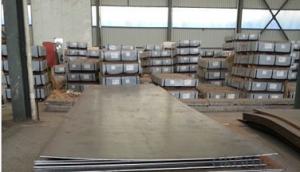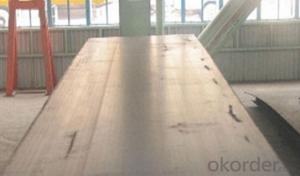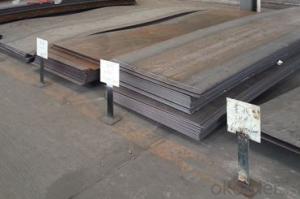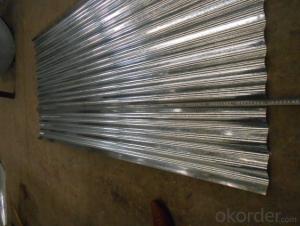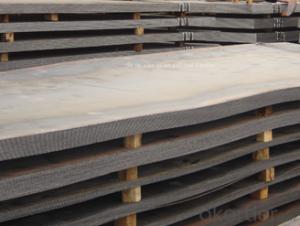Hot Rolled Carbon Steel Sheet A633 CNBM
- Loading Port:
- Qingdao
- Payment Terms:
- TT OR LC
- Min Order Qty:
- 10 pc
- Supply Capability:
- 30 pc/month
OKorder Service Pledge
Quality Product, Order Online Tracking, Timely Delivery
OKorder Financial Service
Credit Rating, Credit Services, Credit Purchasing
You Might Also Like
Quick Details
| Standard: | AISI, ASTM, DIN, GB, JIS | Grade: | A572,A573,A633,A678,A709,A710,G3101,G3136,etc | Thickness: | 1mm-200mm |
| Brand Name: | SHOU GANG GROUP, AN STEEL | Model Number: | Q235 | ||
| Type: | Steel Plate | Technique: | Hot Rolled | Surface Treatment: | Coated |
| Application: | widely | Special Use: | High-strength Steel Plate | Width: | 1000mm-3000mm |
| Length: | 1000mm-12000mm | Price Term: | FOB CIF CFR |
Packaging & Delivery
| Packaging Details: | standard seaworthy export packing or as the request of customers |
| Delivery Detail: | 10 days after deposit or according to customers' quantity |
Specifications
hot rolled carbon steel sheet
1.Thickness:1mm-200mm
2.Length:1000mm-12000mm
3.Width:1000mm-2000mm
hot rolled carbon steel sheet
| Product | HR steel plate prices carbon steel plate prices per kg |
| MOQ | 25 ton |
| Thickness | 1mm-200mm |
| Width | 1000mm-3000mm |
| Length | 1000mm-12000mm |
| Application | widely |
| Standard | AISI,ASTM,BS,DIN,JIS,GB,etc |
| Grade | A572,A573,A633,A678,A709,A710,G3101,G3136,etc |
| Tpye | Steel plate |
| Surfacing | Coated |
| Productive Technology | Hot Rolled & Cold Rolled |
| Port | |
| Payment Terms | L/C,T/T,Western Union,MoneyGram |
| Product Ability | 5000 tons per month |
| Delivery | 10 days after deposit or according to customers' quantity |
| Packing | standard seaworthy export packing or as the request of customers |
- Q:What is the lifespan of steel sheets?
- The lifespan of steel sheets can vary depending on various factors such as the quality of the steel, the environment it is exposed to, and the maintenance it receives. However, with proper care and maintenance, steel sheets can have a lifespan of several decades.
- Q:How are steel sheets different from steel plates?
- Steel sheets and steel plates differ primarily in their thickness. Steel sheets are typically thin, measuring less than 6mm in thickness, while steel plates are thicker, usually measuring 6mm or more. Additionally, steel sheets are commonly used for applications that require flexibility, such as in roofing or automotive panels, whereas steel plates are often utilized in construction, heavy machinery, or structural applications that demand strength and durability.
- Q:What is the average bending radius for steel sheets?
- The bending radius of steel sheets is subject to variation depending on factors such as thickness, grade, and steel type. Nevertheless, in the case of mild steel sheets, the minimum bending radius typically equates to roughly four times the sheet thickness. To illustrate, if the sheet thickness measures 1.6mm, the minimum bending radius would be approximately 6.4mm. It is crucial to recognize that this serves as a general principle, and particular bending specifications may deviate depending on the intended application and desired result.
- Q:What are the different surface treatments for galvanized steel sheets?
- Some of the different surface treatments for galvanized steel sheets include chromate conversion coating, zinc phosphate coating, and organic coating. These treatments help improve the corrosion resistance and aesthetic appearance of the galvanized steel.
- Q:What is the average lifespan of galvanized steel sheets?
- The lifespan of galvanized steel sheets can vary due to several factors, including the environment, maintenance, and usage. Typically, galvanized steel sheets last between 20 and 50 years. However, with proper care, regular inspections, and maintenance practices, this lifespan can be extended. Galvanized steel sheets are renowned for their durability and resistance to corrosion, which contributes to their relatively long lifespan. Nevertheless, exposure to harsh weather conditions, extreme temperatures, and corrosive substances can impact the longevity of galvanized steel sheets. Therefore, it is crucial to consider these factors and implement appropriate maintenance measures to ensure the maximum lifespan of galvanized steel sheets.
- Q:What are the common widths of steel sheets?
- The common widths of steel sheets range from 24 inches to 72 inches, with 36 inches and 48 inches being the most commonly used.
- Q:How do you calculate the weight of a steel sheet?
- To calculate the weight of a steel sheet, you need to know its dimensions (length, width, and thickness) and the density of the specific type of steel being used. The weight can be calculated by multiplying the volume (length x width x thickness) by the density.
- Q:Are steel sheets suitable for automotive body panels?
- Yes, steel sheets are suitable for automotive body panels. Steel is a widely used material in the automotive industry due to its high strength and durability. Steel sheets can withstand the stresses and strains encountered by body panels during vehicle operation, such as impacts, vibrations, and weather conditions. Furthermore, steel can be easily formed into complex shapes, making it an ideal choice for designing various body panel components. Additionally, steel has excellent corrosion resistance properties when properly treated and coated, ensuring the longevity and aesthetics of the vehicle. Overall, steel sheets provide the necessary characteristics required for automotive body panels, making them a suitable choice for manufacturers.
- Q:Can steel sheets be welded or joined together?
- Yes, steel sheets can be welded or joined together using various welding techniques such as arc welding, MIG welding, or TIG welding.
- Q:Are steel sheets suitable for food-grade applications?
- Yes, steel sheets are suitable for food-grade applications. Steel is widely used in the food industry due to its durability, corrosion resistance, and hygienic properties. It is commonly used for food processing equipment, storage tanks, and preparation surfaces. Additionally, stainless steel is the preferred choice for food-grade applications as it is non-reactive and does not leach any harmful substances into the food.
1. Manufacturer Overview |
|
|---|---|
| Location | |
| Year Established | |
| Annual Output Value | |
| Main Markets | |
| Company Certifications | |
2. Manufacturer Certificates |
|
|---|---|
| a) Certification Name | |
| Range | |
| Reference | |
| Validity Period | |
3. Manufacturer Capability |
|
|---|---|
| a)Trade Capacity | |
| Nearest Port | |
| Export Percentage | |
| No.of Employees in Trade Department | |
| Language Spoken: | |
| b)Factory Information | |
| Factory Size: | |
| No. of Production Lines | |
| Contract Manufacturing | |
| Product Price Range | |
Send your message to us
Hot Rolled Carbon Steel Sheet A633 CNBM
- Loading Port:
- Qingdao
- Payment Terms:
- TT OR LC
- Min Order Qty:
- 10 pc
- Supply Capability:
- 30 pc/month
OKorder Service Pledge
Quality Product, Order Online Tracking, Timely Delivery
OKorder Financial Service
Credit Rating, Credit Services, Credit Purchasing
Similar products
New products
Hot products
Related keywords
